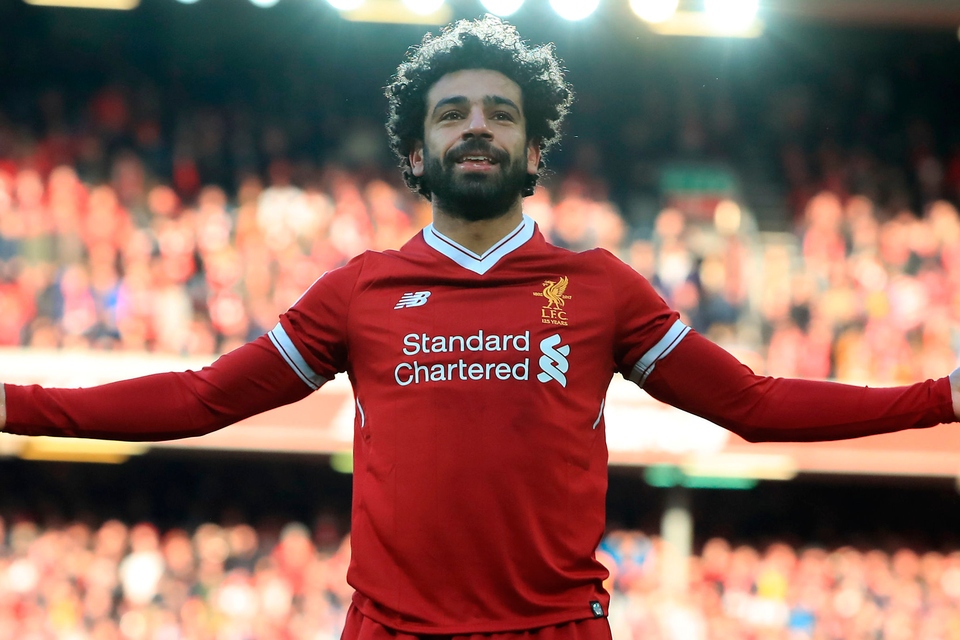
Mohamed Salah secured the Premier League’s top scorer accolade on the final day of the season
Back then, Salah would pick Liverpool to play video games with his friend. Now the player is the Merseyside club’s favourite adopted son, a striker whose goals have inspired his team into the Champions League final later this month. Fans are devoted to their “Egyptian king” – one song includes the line “if he scores another few, I’ll be Muslim too”.
For the people of Nagrig, a small farming community two buses and a train ride north of Cairo, Salah’s rise is scarcely believable. The 25-year-old comes back to the village about once a year, al-Masery says, but he’s been totally unspoilt by fame. “He doesn’t even drive when he comes here,” he says. “He walks around the streets like everyone else, speaking to anyone who wants to talk to him.”

In Britain, Salah is an emerging phenomenon. In Egypt, his progress has been watched and charted for years. It’s difficult to overemphasise his popularity – his face is everywhere. Every coffee shop has a Salah poster. Murals featuring him alongside other icons of Egyptian culture, such as singer Umm Kulthum and novelist Naguib Mahfouz, have appeared around the capital. He beams out from billboards, selling everything from chocolate bars to soft drinks, mobile-phone tariffs and bank accounts. Such is the power of the Mo Salah brand, that when he lent his name to a government-sponsored anti-drugs campaign, they reported a 400 per cent increase in calls to their hotline.

Much has been made in the Egyptian press of Salah’s charity work. It’s been widely reported that he regularly helps newlyweds furnish their new homes with everything they need for marriage, although the recipients of these gifts have never come out publicly. Newspaper columnists and talk-show hosts delight in sharing examples like these of Salah’s good nature, but al-Masery is one of many Nagrig residents who are sceptical. “Most of these stories are just hearsay,” he says. One particularly popular Salah story came after LE 30,000 (€1,420) was stolen from Salah’s father. The thief was caught and in an act of forgiveness, Salah’s family did not press charges. Retellings of the story in the press, however, have Salah intervening personally to help the man find work. One version even has Salah giving the man a wad of cash.

“The media just wants to talk about Salah, Salah, Salah,” al-Masery says. “He’s a nice guy, and very respectful, but not everything written about him is true.”
Not everybody shares al-Masery’s scepticism about the Salah story. In Cairo, where 200 punters crammed on to the pavement at an outdoor coffee shop to watch Liverpool secure their place in the Champion’s League final, 29-year-old football fan Omar Salem says he “doesn’t care” if certain details about the striker are false. “People want to believe these things about him,” he says. “At this point he’s so loved that nobody would ever deny them.”
Before last July, you’d be hard pressed to find anyone here supporting the Merseyside club. That’s all changed this season, though, with football fans regularly turning out in force, for every Liverpool game. “It would just be amazing to have an Egyptian player win the Champions League,” Salem says.
Salem says it was Egypt’s match against Congo in October that marked the beginning of his status as a national icon. Salah’s penalty, four minutes into injury time, put Egypt ahead at the 11th hour, securing the team a place in its first World Cup in 28 years. “When he celebrated that goal,” says Salem, “that’s the image people will remember from that match.”
Salem calls Salah the first big Egyptian player “that people can actually relate to”. “We don’t even know what car he drives,” says Salem. Instead, Salah’s story is that of a humble teenager, who through sheer grit and determination earned the chance to represent his country in the big leagues of Europe.

For the kids of Nagrig, at least, the legend of Mohamed Salah is very real. His former school was renamed in his honour, and to talk to pupils here, you’d think his story was part of the curriculum. One such pupil, 13-year-old Osama Eid, tells the story of Salah’s rise to fame as if reciting his 12-times-tables. “He’s very respectful and kind,” he says, “and well-mannered and does a lot of work to help the poor.” According to Eid’s friends, he’s the best footballer of their gang. When asked if he’d like to be like Salah one day, he doesn’t skip a beat: “Inshallah”.
Observer


